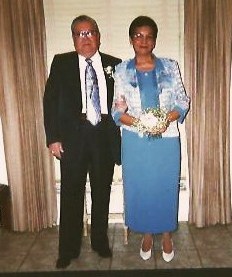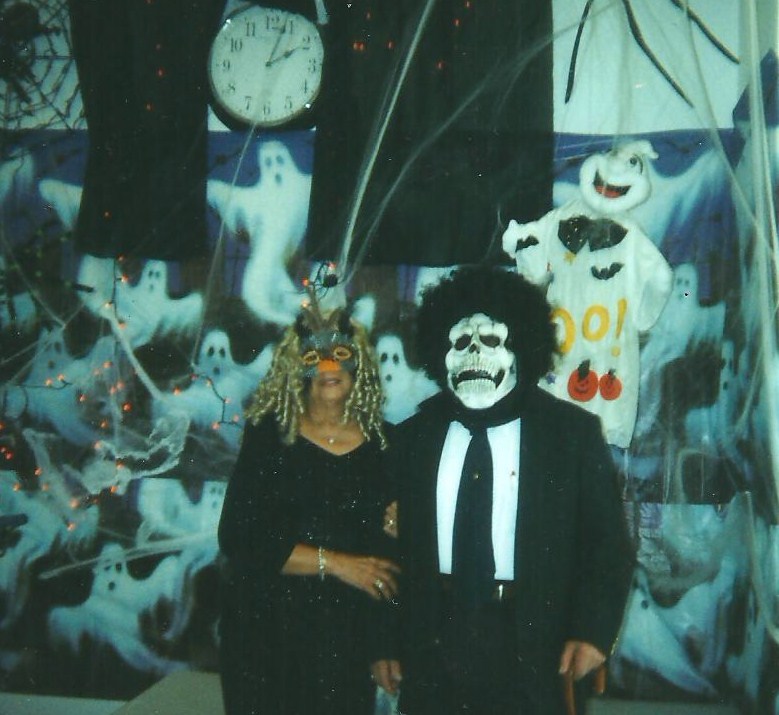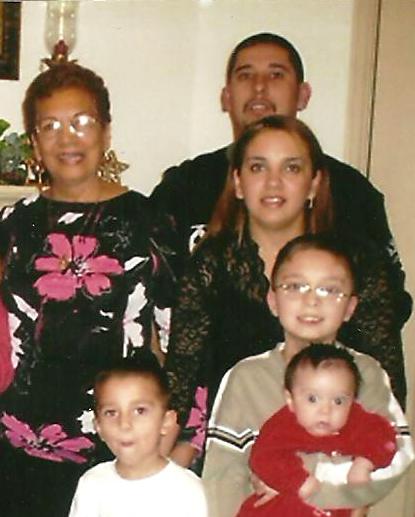TRANSCRIPTION
How was your childhood?
I remember it sad because my mom died when I was 7 years old. Then my dad separated my siblings and me; he took us to Santa Rosa, Nuevo Leon and left us there, each of us with a different family member, such as aunts and godparents. For four years we lived like that until he re-married with a nice lady and brought us together, so we became a family again.
How often you saw your dad?
He came often to see me. I remember when he came on Sundays he used to give me "mi domingo"(that means an small amount of money that parents or godparents used to give children on Sundays that in English is "My allowance"). He gave me 20 cents. Every time he came to see me I wanted to go with him but he always said "no."
How did they treat you?
They treated us well; just when their children did something wrong they blamed us for that. The punishments were sweeping the yard or mop a big patio and we just did what they said.
What did you do with your allowance?
My cousins and I put the money together and bought piloncillo (brown sugar) and shortening. Then we put them in a pan and melted in a fire, we didn't have a stove back then and stirred until it got all melted. When it got cold we made charamuscas (Mexican candy). That's how I spent "mi domingo"(my allowance).
Have you gone to school?
Yes, I started going to school when I was seven years old. I started school at Salinas Victoria, Nuevo Leon. I just went for some days because then my mom died and my dad took me to Santa Rosa, N.L. I started going to school there up to 3th grade but didn't finish it, because my dad took me to live with my godmother to Monterrey there I went to another school to 4th grade. After that my dad married again and took me to Guadalupe, N.L. There I went once again to another school. I did 5th and 6th grade but didn't' finish school. I got frustrated of never having money to carry out my duties at school.
What did you do after leaving school?
I started working as a "nana" (baby sitter). I remember that they paid me "15 pesos". I used to give the money to my stepmother. Then, she bought us what we needed most like socks, shoes or took the money for household expenses. I really did not need money because at the house I was working in; they fed me and gave me money for the bus.
How did you meet your husband? Did you love him when you got married?
He was my neighbor. Well, not really. Every time that I went to the store, he followed me and we talked for about 5 or 10 minutes. My stepmother always came to meet me I guess she knew what was going on between us. He had 14 siblings and they were poor so he wanted to leave his house. At that time my sister got married and I was bored of being at the house, that's why I decided to marry him. We were never boyfriend and girlfriend; you know like the couples do today they go to the theater or to restaurants.
How was your marriage?
I always suffered domestic violence. Such as, when I needed to take my children to the doctor, if I took longer to come back he got angry. Then, I started cooking quickly because he was hungry. When the food was ready he threw the pans against the wall and started telling me bad things because I took too long at the doctor. After that, when he went to work he punish me and my children by taking out one bulb of the TV. This was part of the violence I lived.

Why you did not divorce him?
When I told my stepmother or my mother-in-law about the problems I was having with him, they told me that it was the cross that I should carry until my death. So, I thought was my destiny.
What made you divorce him?
I was going to a therapist because of depression. She is the one that open my eyes and help me realize that I deserve to live a better life.
Have you worked during marriage?
Yes, I ironed, sewed clothes, and cooked hiding from my husband.

When you washed other people clothes, Have you had a washing machine? How much you charged for washing clothes?
No, I washed clothes by hand and I remember that I hung the clothes around a fence that was made of branches to dry them up. I remember pulling out the water from a well that was built by my Dad. It was seventeen meters deep. It had concrete around it, two sticks of wood were holding a tube that had a reel that holds the rope that helped me take out the bucket of water.
I really didn't know how much was fair to charge for the job. They used to pay me four or five pesos for the bulk of clothes, and for that amount I washed and ironed it.
What did you buy with that money?
My children always wished cookies, drinks, bread, milk, so I used the money to make them happy.
Have you ever had any illness?
After I had my 7th child I got a kidney infection. I was very sick and spent two months at the hospital. The doctor found out that I only had one kidney and he had to remove part of it. Then, the doctor told me that I was left with 1/3 of kidney. The doctor use to joke with me every time I had an appointment, he called me his masterpiece.
When was the first time you heard about birth control pills?
When I was pregnant of my 7th child in 1964, that's when samples of it started coming out. But, my husband because of his machismo did not allow me to take them. He told me that better not find out that I was taking them, so I never used them.
What brought you to the U.S.?
When I left my husband, I did not want to live close to him because I was afraid of him. That is why I decided to come to live with one of my daughters here in S.A.
How did you feel after divorced?
Well, at first I used to ask myself if I did right or wrong but then with time I felt calm and without regrets.
How did you meet your current husband?
My granddaughter invited me to a party at his father-in-law's house. There I met her husband's grandfather. The next day he invited me out and started dating. Then we got married two months after I met him.

How is your life now?
I am living a peaceful life, I go to a community center three days a week were I do exercise, play bingo and other activities. Also I'm working Sunday's in a day care in an Episcopal church.


Is there something you regret?
Yes, when I was in 6th grade my teacher told me about a free program to become a teacher, but as it always happened at my house they never had money for anything, and that was my biggest disappointment. That is something that I would have liked to do.
Is there anything else you want to add t this interview?
Well, I want to tell to all the ladies that are suffering domestic violence to be strong and ask for help. It is better for the children to live without their dad, than live frustrated with him, because they see and hear everything. I always felt like a chicken with open wings covering my children.


